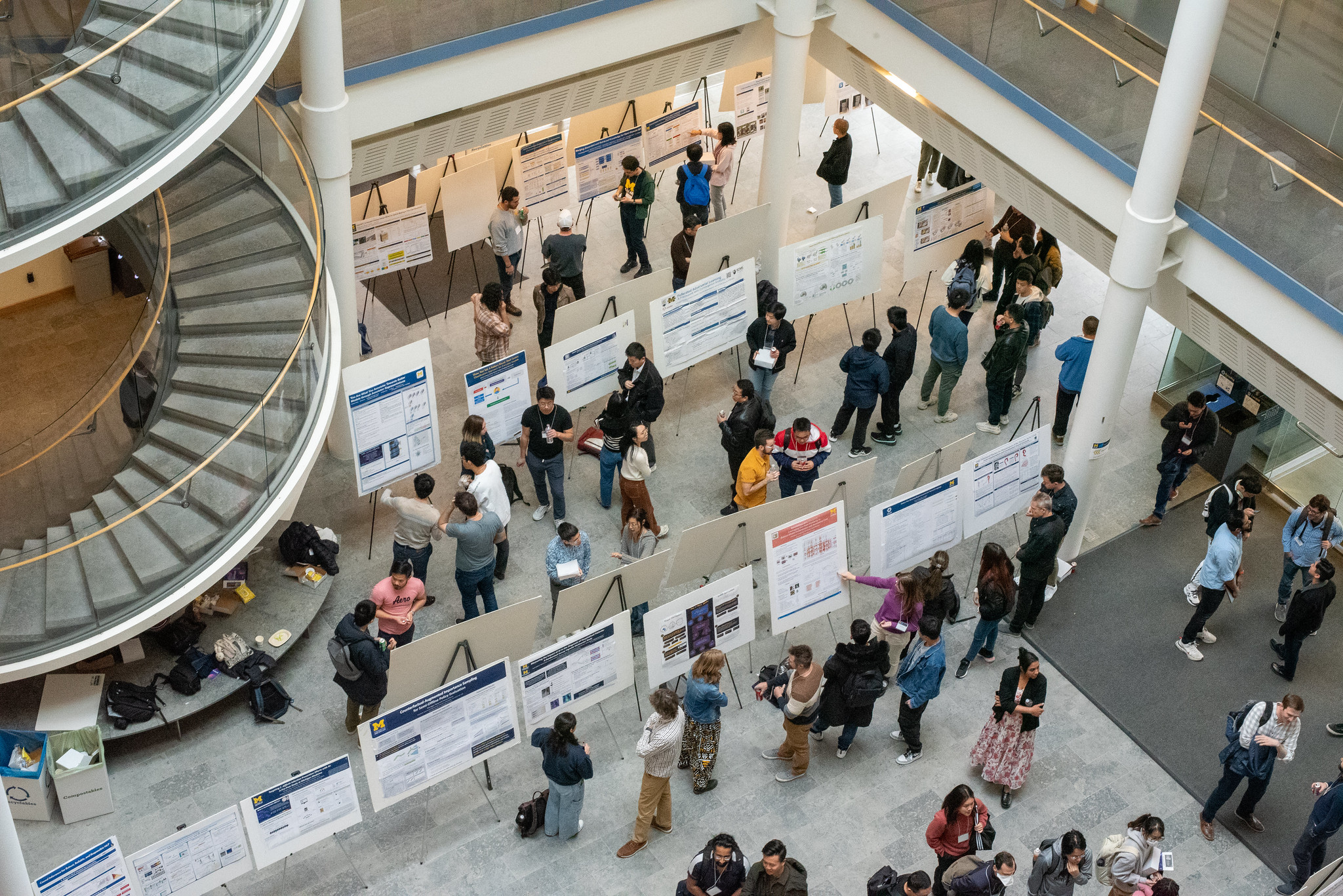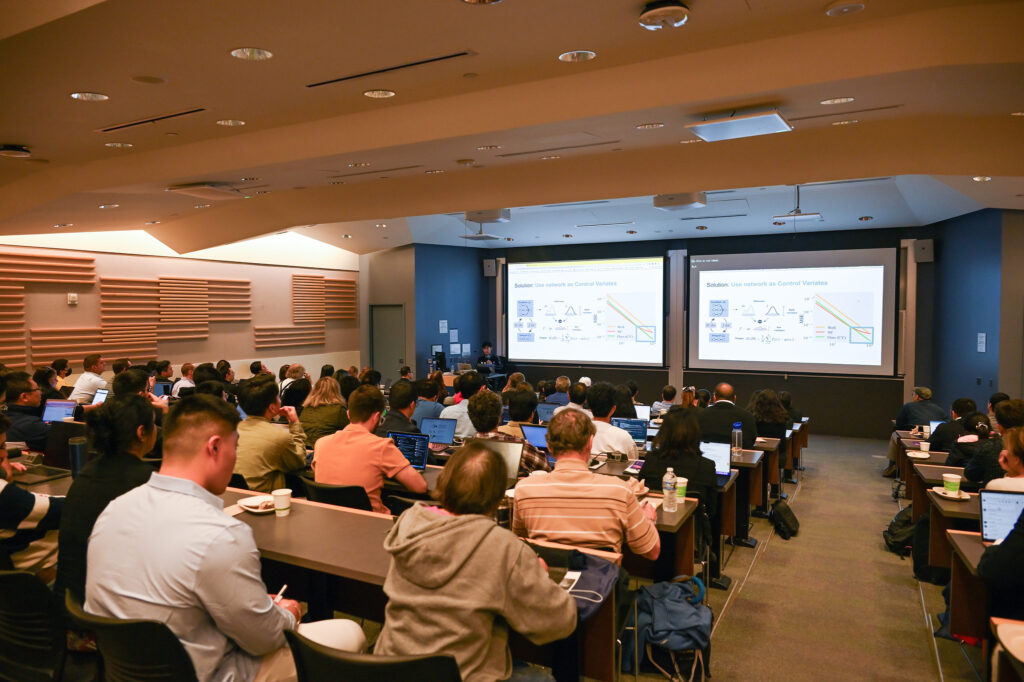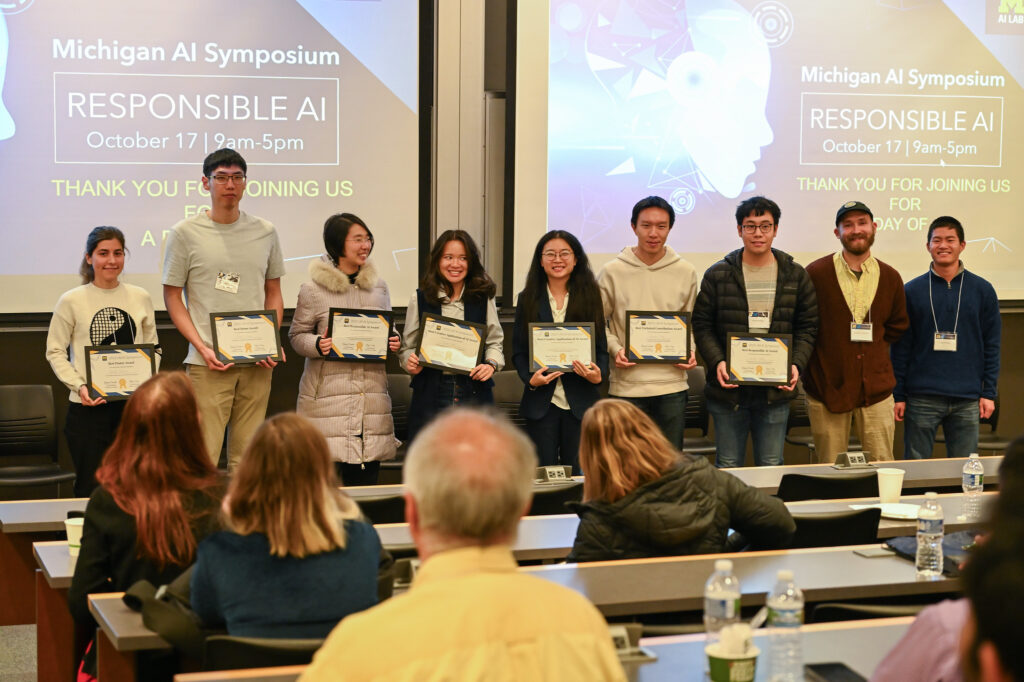Experts convene for sixth Michigan AI Symposium on responsible AI

Over 250 researchers and practitioners of AI convened at the University of Michigan on Tuesday, October 17 for the 6th annual Michigan AI Symposium. The theme of this year’s event was “Responsible AI,” and the symposium brought together thought leaders to share their ideas and findings on the roles, risks, and responsibilities of AI technology in modern society.
Organized by the Michigan AI Lab and chaired by CSE professors Stella Yu and Anhong Guo, the symposium featured research talks by top experts in the field, around 60 poster presentations, and several demos of new innovations in AI. The event was sponsored by LG AI Research, Voxel51, Jane Street, and KLA.
“We were thrilled to welcome so many AI specialists to U-M for this event,” said Yu. “We learned about some of the latest advances in responsible AI, and it provided a great avenue for networking and community-building with other AI researchers.”
Kicking off the event was the first of two keynotes by invited speaker Michael Bernstein, associate professor of computer science at Stanford University. Bernstein spoke about his research on generative agents and their ability to simulate believable human behavior, as well as how such proxying of human behavior is helpful in the design of enhanced online spaces and values-aligned algorithms.
In the afternoon, participants enjoyed a second keynote by invited speaker Alexei “Alyosha” Efros, professor of electrical engineering and computer science at University of California, Berkeley. Efros’s talk emphasized the importance of understanding large-scale data, and the issues it presents, used in AI systems.
In addition to the day’s two keynotes, there were invited talks by U-M researchers performing research in the area of responsible AI, including CSE professors JJ Park, Alexander Rodríguez, and Elizabeth Bondi-Kelly, as well as Robin Brewer of the School of Information.
“There is a lot of buzz surrounding AI these days,” said Guo, “and this symposium provided a great opportunity to hear about the exciting research happening in this space, both at U-M and beyond.”

Another highlight of the event was the poster session, where dozens of participants shared and discussed their research. The following outstanding poster presentations and demos earned the event’s awards:
Best Poster Award
“Syntax-free Meaning Representation for Natural Language”
Nasim Tohidi (K.N. Toosi University of Technology), Chitra Dadkhah (K.N. Toosi University of Technology)
Best Demo Award
“BrushLens: Hardware Interaction Proxies for Accessible Touchscreen Interface Actuation”
Chen Liang (University of Michigan), Yasha Iravantchi (University of Michigan), Thomas Krolikowski (University of Michigan), Ruijie Geng (University of Michigan), Alanson Sample (University of Michigan), Anhong Guo (University of Michigan)
Best Technical Contribution Award (tie)
“Fully Automated Pipeline for Measurement of the Thoracic Aorta Using Joint Segmentation and Localization Neural Network”
Sudeep Katakola (University of Michigan EECS), Timothy J. Baker (University of Michigan Radiology), Zhangxing Bianc (Johns Hopkins ECE), Yanglong Lub (University of Michigan Radiology), Greg Spahlinger (University of Michigan Radiology), Charles R. Hatt (Imbio Inc.), Nicholas S. Burris (University of Michigan Radiology)
“Counterfactual-Augmented Importance Sampling for Semi-Offline Policy Evaluation”
Shengpu Tang (UM-CSE), Jenna Wiens (UM-CSE)
Most Creative Application of AI Award (tie)
“Human Inspired Progressive Alignment and Comparative Learning for Grounded Word Acquisition”
Yuwei Bao (University of Michigan), Barrett Martin Lattimer (University of Michigan, ASAPP), Joyce Chai (University of Michigan)
“Bridge the gap between biological and artificial neural networks”
Lu Mi (Allen Institute for Brain Science, University of Washington)
Best Responsible AI Contribution Award (tie)
“You Are What You Annotate: Towards Better Models through Annotator Representations”
Naihao Deng (University of Michigan), Siyang Liu (University of Michigan), Xinliang Frederick Zhang (University of Michigan), Winston Wu (University of Michigan), Lu Wang (University of Michigan), Rada Mihalcea (University of Michigan)
“Causal NLP Research and the Way towards Social Good”
Zhijing Jin (Max Planck Institute & ETH)

View the full list of posters and demos presented at the symposium and a full list of speakers and abstracts on the symposium webpage.
We thank the incredible student volunteers, staff, and faculty who made this event possible.

 MENU
MENU 
